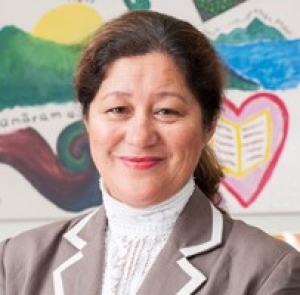

<p><img class=" alignright size-full wp-image-1570" src="http://schoolnewsnz.fastrackdev.com/wp-content/uploads/2015/06/SND16-wk3-OECD-cindy.kiro.jpg" alt="SND16-wk3-OECD-cindy.kiro" style="margin: 5px; float: right;" width="300" height="295" />The University of Auckland&#8217;s Starpath Project has welcomed an OECD report that acknowledges New Zealand&#8217;s education success, but highlights the need to address educational inequality.</p>
<p> <!--more--> </p>
<p>Starpath welcomes a key recommendation made by the OECD to strengthen existing measures, which use student achievement data to ensure all students are performing well.</p>
<p>Starpath, based at the University of Auckland&#8217;s Faculty of Education and Social Work, has spent a decade working with New Zealand secondary schools. It has been developing an intervention based on student achievement data to improve NCEA results and increase tertiary participation for disadvantaged groups.</p>
<p>&#8220;This report highlights a complex yet urgent need to improve educational outcomes for disadvantaged groups in order to achieve economic growth,&#8221; Starpath director Professor Cindy Kiro says.</p>
<p>&#8220;The report&#8217;s findings on educational inequality should be extremely concerning for all New Zealanders. However, we are pleased it has recognised the need for school boards and schools to understand and use data interventions to turn this situation around.</p>
<p>&#8220;This forms an evidence base for understanding and monitoring that improvement is occurring. Unless we address significant under-achievement in our schools, New Zealand&#8217;s economic and social prosperity will remain at risk.&#8221;</p>
<p>The report confirms that while educational attainment has been rising for all groups, rates remain considerably lower for people from lower socio-economic backgrounds and/or of Māori or Pasifika ethnicity.</p>
<p>PISA (international assessment) scores for Māori and Pasifika students are well below average and have also been falling. It goes on to say the impact of socio-economic background on PISA scores is greater and has increased by more in New Zealand than the OECD average.</p>
<p>&#8220;Increasing educational attainment is very important for equality of opportunity in the long term, because parental attainment, especially of mothers, has a strong influence on how well their children do in education,&#8221; the report says.</p>
<p>Professor Kiro adds that, &#8220;We have learned over 10 years that here are things that can be done in schools to improve what is happening academically for a greater number of Māori, Pacific and low income students – and in ways that benefit all children in that school.&#8221;</p>
<p>When implemented in secondary schools, Starpath&#8217;s strategies are associated with consistent improvement in students&#8217; achievement at NCEA Levels 1 and 2 and dramatic increases in parent and whānau engagement.</p>
<p>This intervention is based on a combination of informed data tracking of student progress, academic counselling and mentorship, and increased engagement from parents and caregivers. Leadership and literacy in specific subject areas are also needed to create a whole of school approach to developing and monitoring student achievement.</p>
<p>&#8220;There are a lot of initiatives in schools, but we need to act on a stronger evidence basis about what is working to shift the inequality experienced by Māori and Pacific children and young people. The OECD report is a timely reminder of how important this task is not just for the young people and their families, but for all of us,&#8221; Professor Kiro says.</p>
<p> ;</p>

EXCLUSIVE: Teachers used to be paid two to three times more than minimum wage workers,…
After an “overwhelming” vote to reject the latest Government offer, secondary school teachers will begin…
Second-language learning should be compulsory, says a new report from a forum bringing together academics,…
A new entitlement aimed to improve access to learning support coordinators for schools with students…
Educators have raised questions about the Ministry of Education’s new secondary school subjects, set to…
Professional learning and development (PLD) for teachers needs to be higher impact for teachers and…
This website uses cookies.